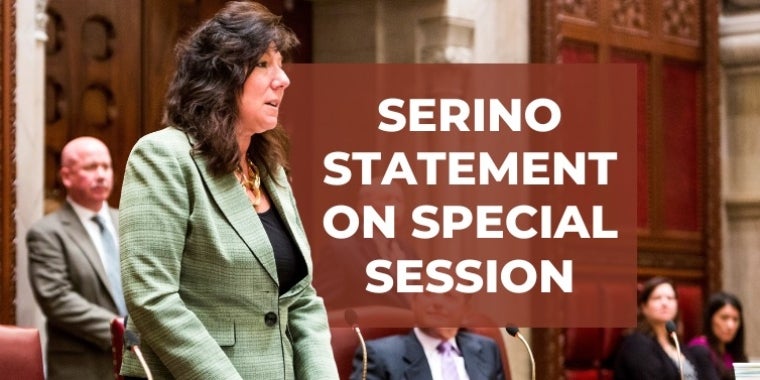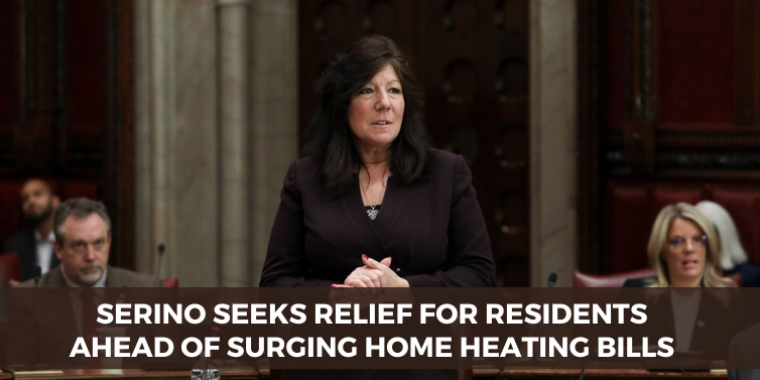AGING CHAIR ANNOUNCES BUDGET WINS FOR NEW YORK SENIORS
April 1, 2016
-
ISSUE:
- Seniors
- STAR (School Tax Relief Program)
- Enhanced Star
- Tax relief
- EPIC (Elderly Pharmaceutical Insurance Coverage Program)
-
COMMITTEE:
- Aging

AGING CHAIR ANNOUNCES BUDGET WINS FOR NEW YORK SENIORS
ALBANY, NY—Senator Sue Serino (R, C, I—Hyde Park), Chair of the Senate’s Committee on Aging today announced budget wins for New York seniors.
“As Chair, it is my job to ensure that our seniors have a voice in Albany,” said Serino. “Throughout the budget process, when everyone under the sun is jockeying for funding, it is my job to remind everyone of the critical role our seniors have played in our communities and of the importance of investing in programs that allow them to age in place. Most importantly, it is my job to ensure that they are made a priority and this year’s budget does that.”
This year’s budget includes funding for:
- STAR and Enhanced STAR: This year, more than $2.7 billion will go toward funding these critical programs that provide significant tax relief for families and seniors each year;
- Elderly Pharmaceutical Insurance Coverage (EPIC): This year’s budget provides $131.5 million to fully fund this program that helps cover the prescription drug needs of countless seniors;
- Alzheimer’s Programs: This year’s budget builds on last year’s historic commitment and dedicates $26.6 million to combat this debilitating disease;
- New York Foundation for Seniors Home Sharing and Respite will receive almost $200,000; and
- Senior Action Council Hotline will receive almost $65,000;
Importantly, the budget also commits $700,000 to support elder abuse prevention initiatives, a cause for which Senator Serino has been outspoken since taking office.
“With studies siting numbers as high as 300,000 cases of elder abuse going unreported each year, I would have liked to see an even greater commitment from the state to protect our seniors from abuse,” Serino said. “However, considering that previously, the state dedicated less than a million dollars statewide to this cause, it is a step in the right direction. I look forward to building on this progress throughout the coming months with legislation solutions.”
$500,000 of the funding dedicated to elder abuse will go toward expanding the successful multi-disciplinary team program.
In FY 2013-2014, the federal government provided funding to state grantees, including New York, for the development of test interventions designed to prevent elder abuse, neglect, and exploitation. As part of the Elder Abuse Prevention Interventions grant initiative, two pilot programs in New York City and in the Finger Lakes were established with the chief aims of improving systems collaboration and awareness of investigating and intervening in complex cases of elder financial exploitation and elder abuse.
Initial reports from the federal programs in the Finger Lakes and New York City regions have shown significant results in preventing the exploitation of older adults and the successful prosecution of criminal cases. The Finger Lakes site alone has reported $514,000 has already been directed to be repaid by a court, or agreed upon in repayment plans, and over $130,000 has been repaid to victims to date.
“The funding provided in this year’s State Budget will help expand these successful programs so that they may be able to deliver the same positive results to residents of the Hudson Valley and communities throughout New York,” said Serino. “It’s a huge win for seniors across the state.”
Additionally, Serino was especially proud to be able to deliver increased funding for Community Services for the Elderly—to the tune of $30.4 million.
“Over 9000 New Yorkers are on wait-lists to receive these critical services,” Serino said. “From adult day services, to in-home care, to transportation, CSE programs not only benefit New York seniors, but their caretakers as well who depend on them for services that they could not reasonably provide on their own. This money will help reduce those waitlists and ensure our seniors have access to the resources they need to age in place with dignity.”
-30-


